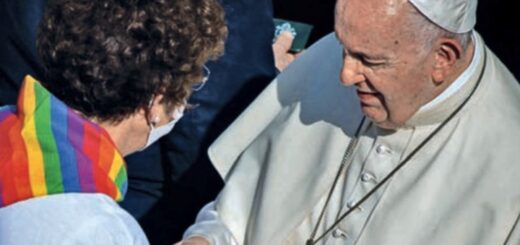"The love that does not dare to pronounce its name" in medieval England
Article published on the project website Music and Late Medieval European Court Cultures (Great Britain) On December 15, 2017, freely translated by Vanessa Guadagnini
The expression "The love that does not dare to pronounce his name"It is a verse of poetryTwo lovesby Lord Alfred Douglas. This expression was used at the end of the nineteenth century as euphemism for homosexuality, even during the trial for obscene acts to Oscar Wilde.
Homosexuality, understood as a specific type of sexual identity, is a social construct of the nineteenth century. It is possible that in the Middle Ages men and women satisfied their physical desires and/or have had the deepest and satisfying sentimental relationships with people of the same sex, but they would never have defined themselves for this "gay", "Lesbians" or "Bisexuals". These are all categorizations of much more recent desires and sexual behaviors.
In popular tradition, Edoardo II was anachronistically labeled like "The first gay king of England". The king had intense and affectionate sentimental relationships with different "Court favorites" male. His contemporaries complained of his "immoderate" and "Excessive affection" For Piers Gaveston, a friend of youth, who was circulated, kidnapped and murdered by some English barons in 1312.
Edoardo also had at least one illegitimate son, Adam, mentioned in a report of the wardrobe (1) of 1322 as Ade Filio Domini regis bastard ("Adam, bastard son of the Lord King"). Adam was probably born around 1307. With his wife Isabella of France, Edoardo became the father of four heirs Plantagenets healthy. Piers Gaveston also had both legitimate and illegitimate children, exactly in the period in which his proximity to the king was causing many political disputes.
It may be complicated to put a modern label to the relationship between Edoardo II and Gaveston; However, we know that their contemporaries made conjectures on the possible sodomy of the king. In 1334 Adam Orleton, bishop of Winchester, was accused of publicly called the king sodom During a preaching made in Oxford in October 1326. He strongly denied the accusation; It would have been too incendiary a statement to be able to be publicly pronounced, whatever people could think in private.
Also the term "sodomy"It is complicated to be defined in a medieval context. As Robert Mills highlights in his book, Seeing Sodomy in the Middle Ages [Sodomy in the Middle Ages] (University of Chicago Press, 2015), medieval references to "Sin of sodomy" (Sodomiticum Peccatum) usually alluded to anal relationships between men, but they could also understand a much wider variety of "Sins against nature" (Contra Naturam). A Too bad against nature It can be defined as any funding action not aimed at human reproduction within the marriage bond. Oral sex, for example, and other forms of sexual activity that "wasted" sperm, could all be classified as sins against nature "sodomitic. It was thought that all these sexual excesses had terrible consequences, and that they would uniform a man making it a Homo Effaminati or Evate VI- An effective man without masculinity.
In the world of the court, the horrible sin of sodomy could also represent a powerful political weapon. After all, the courtiers were almost all men, who lived side by side in a heated competition with each other. Every ambitious man at court wanted to approach (both physically and sentimentally) as much as possible to the king, power and his favors. Men aspired to become "Blood brothers", as in the close pact between Davide and Gionata in the Bible. This could lead them to affectionate and fraternal gestures between them, to the point where the rivals excluded could have interpreted these behaviors as "devoid of masculinity", "effeminate" or "sodomitic".
This could happen well if the "brother" was the king. A king was not to be the same as the others. The idea of a king willing to satisfy the desires of a "brother" (or of his wife), or of a needy, weak and "devoid of masculinity" king, who would never have done what was best for his reign, But only what his personal desires satiated was something that really turned the stomachs of the medieval courtiers.
So what to say about Edoardo II and the accusation of sodomy? In his interesting essay "The Sexualities of Edward II" [The sexuality of Edoardo II] The historian Mark Ormrod detailed in detail of the hypotheses made by the contemporaries of the king regarding his sexuality. He also describes how the reports of Edoardo's death in the Berkeley Castle in 1327, apparently killed by an arched preparation inserted in the anus, or the protests for his "unnatural" relationship with the last favorite of the court, Hugh Despeser the young man, They contributed to fueling some of the fundamental political issues of his domain.
By labeling it as a sexual pervert and a degenerate, inclined to unruly and libertinage (among the various other weaknesses), the reporters of the time could give an explanation to its disastrous kingdom and justify its deposition, which took place in 1327. The rex effeminatus is a rex unnecessary ("Useless king") and, consequently, must be removed from power.
So, while assuming that sex in medieval courts took place frequently, and in all the combinations and partners who can be thought, what really mattered, in the end, was power.
(1) In medieval England, the wardrobe was originally a small room, adjacent to the King's Chamber, in which the clothing, jewels and cash of the sovereign were kept; At the end of the twelfth century, the wardrobe became an autonomous and important department of the Government, which dealt, among other things, to administer the king's prerogative, to lend small sums of money and to pay the mercenaries [NDT].
Original text: The Love that Dare Not Speak Its Name ...






